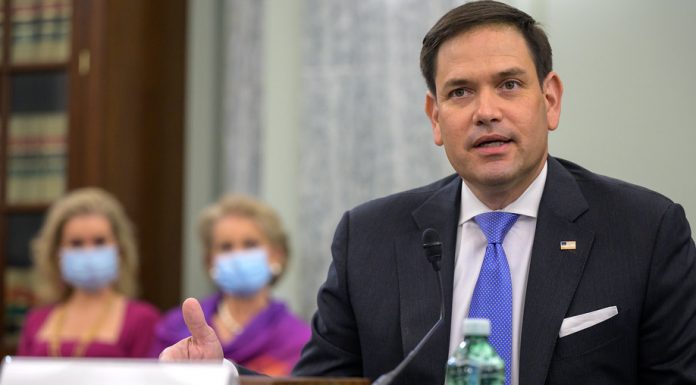(Headline USA) President Joe Biden has done a 180 on U.S. energy policy from his days in the Senate, U.S. Sen. Marco Rubio, R-FL, argues, The Center Square reported.
In an op-ed published by National Review, Rubio points to statements made by then U.S. Senator Biden during a Senate Committee on Foreign Relations hearing on March 30, 2006.
“Does anybody think we would be in the Middle East if, in fact, we were energy independent?” Biden asked.
But Biden prioritizing foreign oil and hampering U.S. energy independence is exactly what he’s doing as president 16 years later, Rubio argues.
Under the Trump administration, in 2019, U.S. energy production exceeded consumption for the first time in 62 years, the U.S. Energy Information Administration reported.
But Biden, instead of fostering domestic production, has done everything he can to hamper it, in addition to asking Venezuelan dictator Nicolas Maduro and Saudi Arabia crown prince Mohammed bin Salman to increase crude production, Eubio says. On his first day in office, Biden halted the Keystone Pipeline, banned new drilling leases on federal lands and waters and implemented a range of regulatory restrictions on the industry. Within six months of Biden entering the White House, gas prices reached highs not seen since 2008. In June, the average national price of a gallon of regular gasoline surpassed $5 a gallon for the first time.
And while the Strategic Petroleum Reserves had been built up prior to the Biden administration, the president is depleting it in an effort to lower gas prices. The U.S. Energy Department also recently announced it was selling nearly a million barrels to China, prompting outrage by Rubio and other Republicans.
When President Donald Trump took office in January 2017, there were approximately 695 million barrels of oil in the Strategic Petroleum Reserve, according to the EIA. Biden first announced releasing 50 million barrels in November, then another 30 million at the beginning of March. He then ordered the daily release of one million barrels a day for the next six months. As of April 22, there were 547,866,000 barrels left, according to a July 5 EIA report.
The White House had downplayed releasing barrels from the SPR, justifying doing so as necessary to “address the pain Americans are feeling at the pump,” and to “lower costs for Americans into the future,” the U.S. Department of Energy said when it announced the sale of barrels from the SPR.
White House press secretary Karine Jean-Pierre told reporters at a briefing Friday that “when it comes to the oil it is something that the oil companies decide. We cannot control what the oil companies do with their oil. You should ask the oil companies about where they are sending the oil they purchase and why.”
But Rubio maintains that “Biden refuses to allow more American oil to be produced and then sends oil from our strategic reserves to other countries.”
And he also warns that “what comes next will be even more embarrassing for the United States: President Biden will almost certainly ask the Chinese Communist Party to power up its refineries and ship refined petroleum products to America. And he will be willing to pay a high price for it, likely by removing hundreds, if not thousands, of tariffs that help American industry compete with cheap – and forced – Chinese labor.”
“Begging China for gasoline would be short-sighted, naïve, and disastrous for America,” he adds, describing it as “a strategic coup” for Chinese president Xi Jinping, who “wants nothing more than to signal China’s supremacy over the United States.”
In an effort to prevent further economic dependence on China, Rubio and fellow Florida Republican Sen. Rick Scott introduced the China Oil Export Prohibition Act to prohibit the U.S. from exporting oil and petroleum products to China.
“It’s absurd that we continue to export oil to Communist China while Americans pay more than $5 per gallon of gas here at home,” Scott said. “In the first three months of 2022 alone, the U.S. sent nearly 52 million barrels of oil and petroleum to Communist China.
“Meanwhile, families here dealing with skyrocketing prices are forced to choose between putting gas in their cars and food on the table for their kids. Americans must come before sales to Communist China.”
In March, Rubio and other colleagues introduced bills to prevent the U.S. from importing oil and natural gas from Iran and Venezuela and from purchasing Russian oil.

